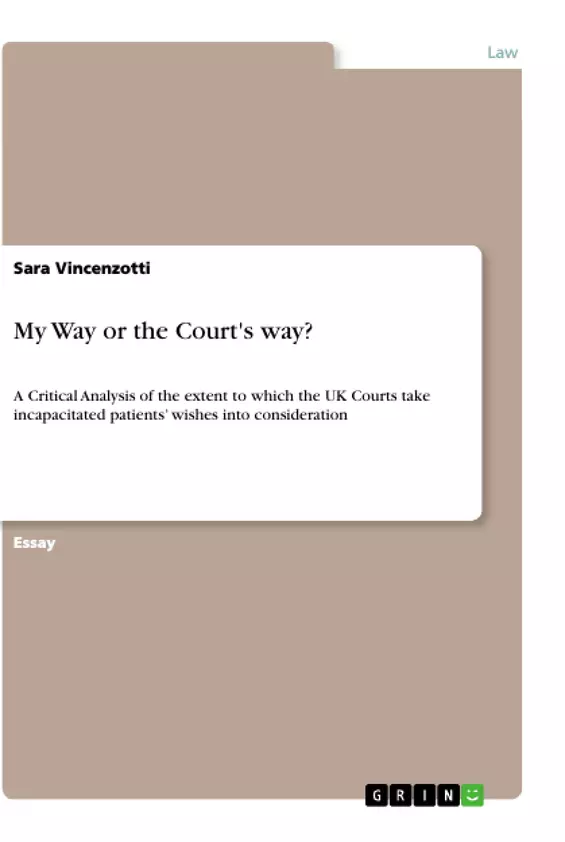A patients’ role was historically recognised as being considerably limited, arguably nonexistent, in determining what was considered to be their best interests. This essay will engage in a critical analysis of judge-made law relating to the extent of incapacitated patient participation in the assessment of their best interests. In an effort to do so, it will start by assessing the noteworthy judgements which have developed the extent in which an incapacitated patient’s wishes, feelings and views may be taken into account. This evaluation will prove the dynamic shift in societal opinion and medical practice, which developed a paternalistic ‘doctor knows best approach’ of bests interests to a patient centered one instead. Following this, I will engage in a critical case analysis of Peter Jackson J’s antagonistic judgements in A Local Authority v E and the later decision of Wye Valley. This comparison will be used to show how the extent to which the courts have taken into account an incapacitated patient’s wishes has conclusively expanded over time. Finally, I will conclude by analysing what the relevant advantages and disadvantages are of incorporating a patient’s wishes into the best interests test assessment.
Inhaltsverzeichnis (Table of Contents)
- Introduction
- Development of the Common Law
- The best interest test
- The first key development
- The increase of focus
Zielsetzung und Themenschwerpunkte (Objectives and Key Themes)
This essay critically analyzes the extent to which UK courts consider incapacitated patients' wishes in determining their best interests. It examines the evolution of this concept in the common law, highlighting the shift from a paternalistic approach to a patient-centered one. The essay delves into key legal judgments and analyzes the balance between a patient's wishes and medical professionals' opinions.
- Evolution of the best interests test in UK law
- Shifting societal and medical perspectives on patient autonomy
- The role of courts in assessing best interests for incapacitated patients
- The weight given to incapacitated patients' wishes and values
- Balancing patient autonomy and medical interventions
Zusammenfassung der Kapitel (Chapter Summaries)
- Introduction: This section outlines the changing landscape of medical law concerning incapacitated patients' participation in treatment decisions. It highlights the shift from a limited role to a more patient-centered approach and introduces the essay's objective to critically analyze the role of courts in incorporating incapacitated patients' wishes.
- Development of the Common Law: This chapter traces the evolution of the best interests test, exploring landmark cases like F v West Berkshire, Bland, and Re A. It examines how the courts gradually incorporated patients' wishes, values, and beliefs into the best interests assessment, moving away from a purely paternalistic approach.
Schlüsselwörter (Keywords)
This essay focuses on the legal framework surrounding incapacitated patients' participation in treatment decisions in the UK. Key concepts include best interests test, patient autonomy, legal capacity, medical ethics, judicial interpretation, and landmark cases like F v West Berkshire, Bland, and Re A. The analysis explores the balance between a patient's wishes and medical professionals' opinions, emphasizing the evolving role of courts in safeguarding patient rights.
Frequently Asked Questions
What is the "best interests test" in UK medical law?
The best interests test is a legal standard used by courts and medical professionals to make decisions for patients who lack the capacity to make decisions for themselves. It has evolved from a paternalistic "doctor knows best" approach to one that is more patient-centered.
To what extent are an incapacitated patient's wishes taken into account?
The common law has shifted significantly to give more weight to a patient's past wishes, feelings, and values. Even if a patient is currently incapacitated, their previously expressed views are now a central part of the assessment.
What was the significance of the "Wye Valley" case?
The Wye Valley case demonstrated a conclusive expansion in how courts value a patient's wishes, showing that even if a patient lacks capacity, their strongly held beliefs must be given serious consideration against medical intervention.
What are the advantages of incorporating patient wishes into legal decisions?
The main advantages include respecting individual autonomy, upholding human dignity, and ensuring that medical treatment aligns with the person's lifelong values and identity.
How did societal opinions on medical practice change over time?
There has been a dynamic shift from a paternalistic model, where doctors made all decisions, to a modern approach that emphasizes patient participation and self-determination, even in cases of incapacity.
- Citation du texte
- Sara Vincenzotti (Auteur), 2020, My Way or the Court's way?, Munich, GRIN Verlag, https://www.grin.com/document/903670



